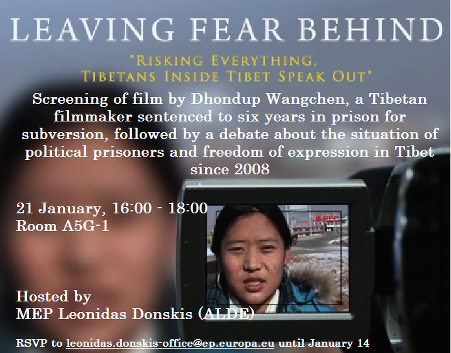On January 21, 2014, MEP Leonidas Donskis (ALDE, Lithuania) and the International Campaign for Tibet screened an important documentary on Tibet in the European Parliament. Leaving Fear Behind is a rare film featuring interviews with Tibetans across Tibet boldly expressing their views to camera about the Dalai Lama, the Olympics and human rights. Dhondup Wangchen, who travelled across Tibet to record the interviews, was imprisoned for six years as a result of the film.
The screening in the European Parliament was followed by a debate about the situation of political prisoners and freedom of expression in Tibet since 2008, and the relationship of China and the EU. MEP Donskis observed that Tibetans face many obstacles; on the one hand that China is challenging Europe with its ‘authoritarian modernisation’, while on the other, Tibet is fighting “our moral blindness” when European democracies are celebrating the economic might of China.
Leaving Fear Behind is based on 35 hours of footage and 108 interviews conducted in the Amdo region at great risk before March, 2008. Shortly after the film was distributed outside of China, Dhondup Wangchen was arrested and initially detained on suspicion of “illegal journalism”, which is not an offense under Chinese law.
The documentary was secretly shown to journalists in Beijing a few days before the start of the Olympics in 2008 and described by The New York Times as “an unadorned indictment of the Chinese government”.
In 2012, Dhondup Wangchen won the International Press Freedom Award of the Committee to Protect Journalists. The award recognizes journalists who show courage in defending press freedom despite facing attacks, threats, or imprisonment. He was honored in absentia due to his ongoing imprisonment. Wangchen’s sentence will end in 2014. However, the exact date of his release is currently unknown.
MEP Donskis pointed out how this documentary sent a message of courage to the world. Courage is usually expected to be a feature of few, selected heroes, whereas in Leaving Fear Behind it is manifested by all the people interviewed, by the ordinary people.
Guest speakers at the event were Ms. Kate Saunders, Communications Director at ICT, and Ms. Gyaltsen Drolkar, a Tibetan nun and former political prisoner currently living in Belgium.
Ms. Saunders gave a presentation focusing on the significance of the film, noting that Dhondup Wangchen’s last day of filming was on March 10, 2008, when protests broke out that swept across the Tibetan plateau. She spoke about the new strategies being used by Tibetans like Dhondup Wangchen to ensure the survival of their Tibetan national identity, and talked about new songs, literature, and blogs as aa symbol of Tibetan people’s determination. Ms. Saunders gave further examples of courageous Tibetans currently imprisoned for the sole reason of exercising their right of freedom of expression, such as Tashi Rabten, a young student sentenced to four years in prison after publishing a collection of political articles on the 2008 protests in Lhasa.
Ms. Drolkar talked about her personal experience in Drapchi prison, Lhasa, where she spent twelve years of her life. In 1990, at the age of 19, she was arrested for taking part in a peaceful demonstration calling for the Dalai Lama’s return to Tibet and a few months later sentenced to 4 years in prison for “separatist activities”. However, her sentence was extended by 8 years for taking part, while in prison, in the secret recording of songs calling for freedom and describing her loyalty and devotion to the Dalai Lama, and the conditions in Drapchi. The group of the 14 nuns involved in the recording and smuggling of the songs outside the prison was called “the singing nuns of Drapchi prison”. Her presentation recalled painful memories of torture, beatings and solitary confinement in prison. Gyaltsen Drolkar was finally released in 2002 and was granted asylum in Belgium in 2004.
In his concluding remarks, MEP Donskis stressed that with China the EU is still hostage of old realpolitik dynamics and that Tibet is a litmus test case for the EU to prove what values it stands for. History showed that success in the field of human rights is only possible when EU Member States speak united with one voice.
